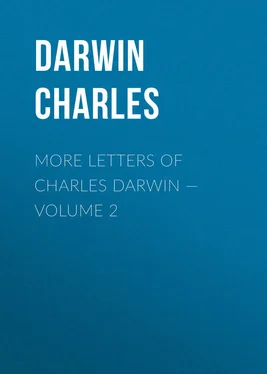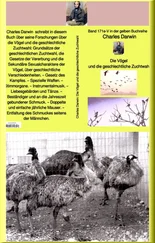Charles Darwin - More Letters of Charles Darwin — Volume 2
Здесь есть возможность читать онлайн «Charles Darwin - More Letters of Charles Darwin — Volume 2» — ознакомительный отрывок электронной книги совершенно бесплатно, а после прочтения отрывка купить полную версию. В некоторых случаях можно слушать аудио, скачать через торрент в формате fb2 и присутствует краткое содержание. Жанр: foreign_antique, foreign_prose, на английском языке. Описание произведения, (предисловие) а так же отзывы посетителей доступны на портале библиотеки ЛибКат.
- Название:More Letters of Charles Darwin — Volume 2
- Автор:
- Жанр:
- Год:неизвестен
- ISBN:нет данных
- Рейтинг книги:5 / 5. Голосов: 1
-
Избранное:Добавить в избранное
- Отзывы:
-
Ваша оценка:
- 100
- 1
- 2
- 3
- 4
- 5
More Letters of Charles Darwin — Volume 2: краткое содержание, описание и аннотация
Предлагаем к чтению аннотацию, описание, краткое содержание или предисловие (зависит от того, что написал сам автор книги «More Letters of Charles Darwin — Volume 2»). Если вы не нашли необходимую информацию о книге — напишите в комментариях, мы постараемся отыскать её.
More Letters of Charles Darwin — Volume 2 — читать онлайн ознакомительный отрывок
Ниже представлен текст книги, разбитый по страницам. Система сохранения места последней прочитанной страницы, позволяет с удобством читать онлайн бесплатно книгу «More Letters of Charles Darwin — Volume 2», без необходимости каждый раз заново искать на чём Вы остановились. Поставьте закладку, и сможете в любой момент перейти на страницу, на которой закончили чтение.
Интервал:
Закладка:
LETTER 455. TO G.H.K. THWAITES. Down, February 13th {N.D.}
I wrote a little time ago asking you an odd question about elephants, and now I am going to ask you an odder. I hope that you will not think me an intolerable bore. It is most improbable that you could get me an answer, but I ask on mere chance. Macacus silenus (455/1. Macacus silenus L., an Indian ape.) has a great mane of hair round neck, and passing into large whiskers and beard. Now what I want most especially to know is whether these monkeys, when they fight in confinement (and I have seen it stated that they are sometimes kept in confinement), are protected from bites by this mane and beard. Any one who watched them fighting would, I think, be able to judge on this head. My object is to find out with various animals how far the mane is of any use, or a mere ornament. Is the male Macacus silenus furnished with longer hair than the female about the neck and face? As I said, it is a hundred or a thousand to one against your finding out any one who has kept these monkeys in confinement.
LETTER 456. TO F. MULLER. Down, August 28th {1870}.
I have to thank you very sincerely for two letters: one of April 25th, containing a very curious account of the structure and morphology of Bonatea. I feel that it is quite a sin that your letters should not all be published! but, in truth, I have no spare strength to undertake any extra work, which, though slight, would follow from seeing your letters in English through the press — not but that you write almost as clearly as any Englishman. This same letter also contained some seeds for Mr. Farrer, which he was very glad to receive.
Your second letter, of July 5th, was chiefly devoted to mimicry in lepidoptera: many of your remarks seem to me so good, that I have forwarded your letter to Mr. Bates; but he is out of London having his summer holiday, and I have not yet heard from him. Your remark about imitators and imitated being of such different sizes, and the lower surface of the wings not being altered in colour, strike me as the most curious points. I should not be at all surprised if your suggestion about sexual selection were to prove true; but it seems rather too speculative to be introduced in my book, more especially as my book is already far too speculative. The very same difficulty about brightly coloured caterpillars had occurred to me, and you will see in my book what, I believe, is the true explanation from Wallace. The same view probably applies in part to gaudy butterflies. My MS. is sent to the printers, and, I suppose, will be published in about three months: of course I will send you a copy. By the way, I settled with Murray recently with respect to your book (456/1. The translation of "Fur Darwin," published in 1869.), and had to pay him only 21 pounds 2 shillings 3 pence, which I consider a very small price for the dissemination of your views; he has 547 copies as yet unsold. This most terrible war will stop all science in France and Germany for a long time. I have heard from nobody in Germany, and know not whether your brother, Hackel, Gegenbaur, Victor Carus, or my other friends are serving in the army. Dohrn has joined a cavalry regiment. I have not yet met a soul in England who does not rejoice in the splendid triumph of Germany over France (456/2. See Letter 239, Volume I.): it is a most just retribution against that vainglorious, war-liking nation. As the posts are all in confusion, I will not send this letter through France. The Editor has sent me duplicate copies of the "Revue des Cours Scientifiques," which contain several articles about my views; so I send you copies for the chance of your liking to see them.
LETTER 457. A.R. WALLACE TO CHARLES DARWIN. Holly House, Barking, E., January 27th, 1871.
Many thanks for your first volume (457/1. "The Descent of Man".), which I have just finished reading through with the greatest pleasure and interest; and I have also to thank you for the great tenderness with which you have treated me and my heresies.
On the subject of "sexual selection" and "protection," you do not yet convince me that I am wrong; but I expect your heaviest artillery will be brought up in your second volume, and I may have to capitulate. You seem, however, to have somewhat misunderstood my exact meaning, and I do not think the difference between us is quite so great as you seem to think it. There are a number of passages in which you argue against the view that the female has in any large number of cases been "specially modified" for protection, or that colour has generally been obtained by either sex for purposes of protection. But my view is, as I thought I had made it clear, that the female has (in most cases) been simply prevented from acquiring the gay tints of the male (even when there was a tendency for her to inherit it), because it was hurtful; and that, when protection is not needed, gay colours are so generally acquired by both sexes as to show that inheritance by both sexes of colour variations is the most usual, when not prevented from acting by Natural Selection. The colour itself may be acquired either by sexual selection or by other unknown causes.
There are, however, difficulties in the very wide application you give to sexual selection which at present stagger me, though no one was or is more ready than myself to admit the perfect truth of the principle or the immense importance and great variety of its applications.
Your chapters on "Man" are of intense interest — but as touching my special heresy, not as yet altogether convincing, though, of course, I fully agree with every word and every argument which goes to prove the "evolution" or "development" of man out of a lower form. My ONLY difficulties are, as to whether you have accounted for EVERY STEP of the development by ascertained laws.
I feel sure that the book will keep up and increase your high reputation, and be immensely successful, as it deserves to be...
LETTER 458. TO G.B. MURDOCH. Down, March 13th, 1871.
(458/1. We are indebted to Mr. Murdoch for a draft of his letter dated March 10th, 1871. It is too long to be quoted at length; the following citations give some idea of its contents: "In your 'Descent of Man,' in treating of the external differences between males and females of the same variety, have you attached sufficient importance to the different amount and kind of energy expended by them in reproduction?" Mr. Murdoch sums up: "Is it wrong, then, to suppose that extra growth, complicated structure, and activity in one sex exist as escape-valves for surplus vigour, rather than to please or fight with, though they may serve these purposes and be modified by them?")
I am much obliged for your valuable letter. I am strongly inclined to think that I have made a great and complete oversight with respect to the subject which you discuss. I am the more surprised at this, as I remember reflecting on some points which ought to have led me to your conclusion. By an odd chance I received the day before yesterday a letter from Mr. Lowne (author of an excellent book on the anatomy of the Blow-fly) (458/2. "The Anatomy and Physiology of the Blow-fly (Musca vomitaria L.)," by B.T. Lowne. London, 1870.) with a discussion very nearly to the same effect as yours. His conclusions were drawn from studying male insects with great horns, mandibles, etc. He informs me that his paper on this subject will soon be published in the "Transact. Entomolog. Society." (458/3. "Observations on Immature Sexuality and Alternate Generation in Insects." By B.T. Lowne. "Trans. Entomolog. Soc." 1871 {Read March 6th, 1871}. "I believe that certain cutaneous appendages, as the gigantic mandibles and thoracic horns of many males, are complemental to the sexual organs; that, in point of fact, they are produced by the excess of nutriment in the male, which in the female would go to form the generative organs and ova" (loc. cit., page 197).) I am inclined to look at your and Mr. Lowne's view as specially valuable from probably throwing light on the greater variability of male than female animals, which manifestly has much bearing on sexual selection. I will keep your remarks in mind whenever a new edition of my book is demanded.
Читать дальшеИнтервал:
Закладка:
Похожие книги на «More Letters of Charles Darwin — Volume 2»
Представляем Вашему вниманию похожие книги на «More Letters of Charles Darwin — Volume 2» списком для выбора. Мы отобрали схожую по названию и смыслу литературу в надежде предоставить читателям больше вариантов отыскать новые, интересные, ещё непрочитанные произведения.
Обсуждение, отзывы о книге «More Letters of Charles Darwin — Volume 2» и просто собственные мнения читателей. Оставьте ваши комментарии, напишите, что Вы думаете о произведении, его смысле или главных героях. Укажите что конкретно понравилось, а что нет, и почему Вы так считаете.












